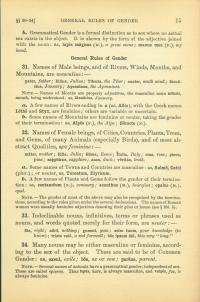31. Names of Male beings, and of Rivers, Winds, Months, and Mountains, are masculine:
pater father
Iūlius Julius
Tiberis the Tiber
auster south wind
Iānuārius January
Apennīnus the Apennines
Note— Names of Months are properly adjectives, the masculine noun mēnsis, month, being understood: Iānuārius, January.
a. A few names of Rivers ending in -a (as, Allia), with the Greek names Lēthē and Styx, are feminine; others are variable or uncertain.
b. Some names of Mountains are feminine or neuter, taking the gender of their termination.
Alpēs (f.) the Alps
Sōracte (n.)
32. Names of Female beings, of Cities, Countries, Plants, Trees, and Gems, of many Animals (especially Birds), and of most abstract Qualities, are feminine.
māter mother
Iūlia Julia
Rōma Rome
Ītalia Italy
rosa rose
pīnus pine
sapphīrus sapphire
anas duck
vēritās truth
a. Some names of Towns and Countries are masculine or neuter.
Sulmō (m.)
Gabiī (m. plural)
Tarentum, Illyricum (n.)
b. A few names of Plants and Gems follow the gender of their termination.
centaurēum (n.) centaury
acanthus (m.) bearsfoot
opalus (m.) opal
Note— The gender of most of the above may also be recognized by the terminations, according to the rules given under the several declensions. The names of Roman women were usually feminine adjectives denoting their gēns or house (see § 108.b).
33. Indeclinable nouns, infinitives, terms or phrases used as nouns, and words quoted merely for their form, are neuter.
fās right
nihil nothing
gummī gum
scīre tuum your knowledge (to know)
trīste valē a sad farewell
hōc ipsum diū this very “long”
34. Many nouns may be either masculine or feminine, according to the sex of the object. These are said to be of Common Gender.
exsul exile
bōs ox or cow
parēns parent
Note— Several names of animals have a grammatical gender, independent of sex. These are called epicene. Thus lepus (hare) is always masculine, and vulpēs (fox) is always feminine.

